
AP, Eugene :
Inside a mosque in the college town of Eugene, a half-dozen men prostrated themselves on a carpet while another man led the midday prayers. Over his melodic recitation came a tapping sound as a locksmith installed higher-grade locks on the front door.
The worshippers at the Eugene Islamic Center are worried about their security. A man recently appeared outside the mosque and threatened to kill Muslims.
Barely two weeks later, an assailant stabbed two men to death and wounded a third on a commuter train in Portland, 110 miles (180 kilometers) to the north. The victims were trying to protect two teenage girls, one of whom was wearing a hijab, as the man shouted anti-Islamic slurs.
Looking ahead, Muslim leaders and others are concerned about anti-Shariah, or Islamic law, marches planned for Saturday in Seattle and about two-dozen other U.S. cities, saying the marches are really anti-Muslim. They consider the Portland and Eugene incidents, and other recent anti-Muslim crimes in America, part of an alarming trend that came to the forefront in last year’s presidential election with far-right activists portraying Islam – and all Muslims – as a threat.
“Our Muslim community is feeling a tremendous amount of stress and pressure,” said former Seattle Mayor Mike McGinn, who plans to attend a counter-rally Saturday. “It’s important for local leaders to express solidarity and make clear we stand against bigotry, against racism and with our Muslim neighbors in the state and beyond.”
The group organizing the rallies, ACT for America, has chapters around the country and says it is focused on fighting terrorism and promoting national security. It says it condemns bias against religious groups and is “proud to stand shoulder to shoulder with peaceful Western Muslims as well as peaceful Muslims worldwide.”
Yet many Muslims and others say the group promotes a distorted and prejudiced view of Islam.
ACT for America activists portray Shariah as largely incompatible with American democracy and often warn of a stealth effort to replace U.S. law with Islamic law. Muslims call the claims ludicrous and say Islamic law plays a role similar to Jewish law, as a guide to religious life rooted in the Quran.
Aneelah Afzali, who heads a Seattle-area group that works against discrimination and hate crimes, said she will be putting up an “ask a Muslim booth” near Seattle’s anti-Shariah rally, “so people can ask questions directly about Islam, and we can counter conspiracy theories, accusations and lies that come from that hate rally.”
Inside a mosque in the college town of Eugene, a half-dozen men prostrated themselves on a carpet while another man led the midday prayers. Over his melodic recitation came a tapping sound as a locksmith installed higher-grade locks on the front door.
The worshippers at the Eugene Islamic Center are worried about their security. A man recently appeared outside the mosque and threatened to kill Muslims.
Barely two weeks later, an assailant stabbed two men to death and wounded a third on a commuter train in Portland, 110 miles (180 kilometers) to the north. The victims were trying to protect two teenage girls, one of whom was wearing a hijab, as the man shouted anti-Islamic slurs.
Looking ahead, Muslim leaders and others are concerned about anti-Shariah, or Islamic law, marches planned for Saturday in Seattle and about two-dozen other U.S. cities, saying the marches are really anti-Muslim. They consider the Portland and Eugene incidents, and other recent anti-Muslim crimes in America, part of an alarming trend that came to the forefront in last year’s presidential election with far-right activists portraying Islam – and all Muslims – as a threat.
“Our Muslim community is feeling a tremendous amount of stress and pressure,” said former Seattle Mayor Mike McGinn, who plans to attend a counter-rally Saturday. “It’s important for local leaders to express solidarity and make clear we stand against bigotry, against racism and with our Muslim neighbors in the state and beyond.”
The group organizing the rallies, ACT for America, has chapters around the country and says it is focused on fighting terrorism and promoting national security. It says it condemns bias against religious groups and is “proud to stand shoulder to shoulder with peaceful Western Muslims as well as peaceful Muslims worldwide.”
Yet many Muslims and others say the group promotes a distorted and prejudiced view of Islam.
ACT for America activists portray Shariah as largely incompatible with American democracy and often warn of a stealth effort to replace U.S. law with Islamic law. Muslims call the claims ludicrous and say Islamic law plays a role similar to Jewish law, as a guide to religious life rooted in the Quran.
Aneelah Afzali, who heads a Seattle-area group that works against discrimination and hate crimes, said she will be putting up an “ask a Muslim booth” near Seattle’s anti-Shariah rally, “so people can ask questions directly about Islam, and we can counter conspiracy theories, accusations and lies that come from that hate rally.”

